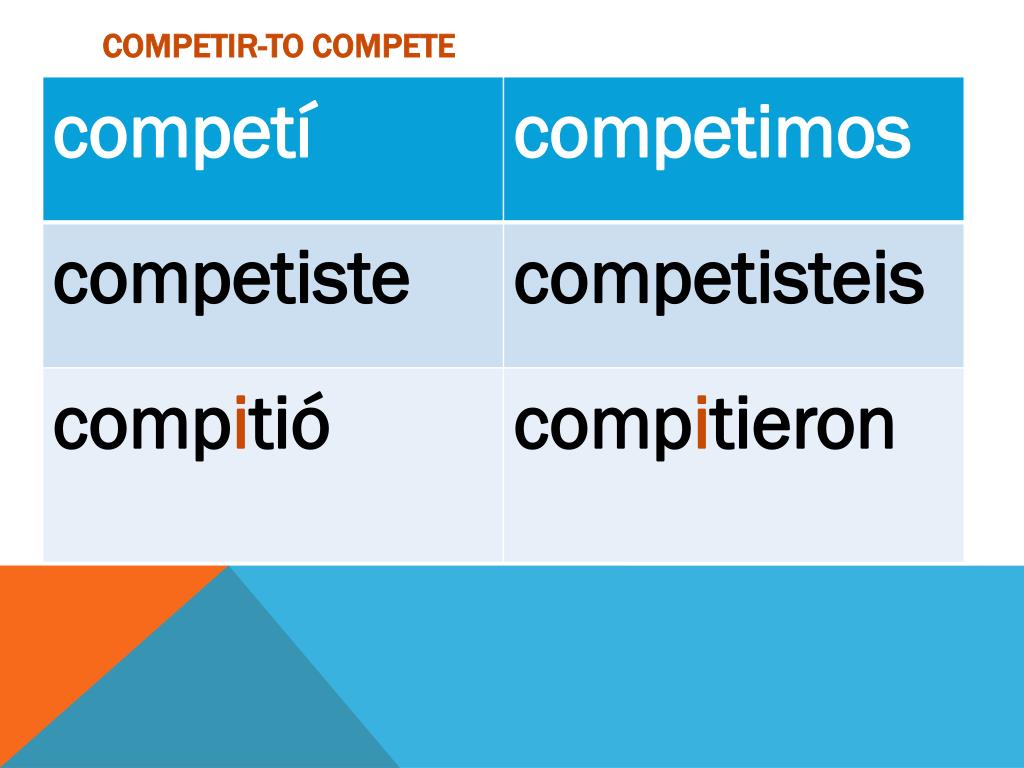Ready to talk about competition in Spanish? “Competir,” meaning “to compete,” is your go-to verb, and this comprehensive guide will equip you with the knowledge to use it confidently in any situation. Whether you’re a beginner or looking to refine your skills, we’ll break down competir‘s conjugation across all tenses and moods, complete with clear explanations and practical examples. Let’s dive in!
Mastering Competir: A Deep Dive into Conjugation
Competir is a slightly irregular verb due to its stem change, where the ‘e’ sometimes transforms into an ‘i’. Don’t worry; we’ll demystify this process, providing you with a solid understanding of how competir works in different contexts. This guide aims to empower you to use competir correctly and fluently, from simple daily conversations to more complex expressions.
Understanding the e:i Stem Change
Before we delve into the conjugations, let’s address the key quirk of competir: the stem change. This verb belongs to the e:i stem-changing family, meaning the ‘e’ in the stem shifts to an ‘i’ when the stress falls on the stem syllable. This change primarily occurs in the present indicative, present subjunctive, and imperative moods. Think of it as the verb preparing for action! However, nosotros and vosotros forms in the present indicative are exceptions, retaining the original ‘e.’
Conjugation Tables and Examples
Present Indicative: Talking About Current Competition
This tense describes actions happening now, habitual actions, and general truths. Here’s where the stem change comes into play:
| Pronoun | Conjugation | Example |
|---|---|---|
| yo | compito | Yo compito en ajedrez. (I compete in chess.) |
| tú | compites | Tú compites en ciclismo. (You compete in cycling.) |
| él/ella/usted | compite | Él compite en natación. (He competes in swimming.) |
| nosotros/as | competimos | Competimos en fútbol. (We compete in soccer.) |
| vosotros/as | competís | Competís en baloncesto. (You all compete in basketball.) |
| ellos/ellas/ustedes | compiten | Compiten en tenis. (They compete in tennis.) |
Preterite Tense: Talking About Past Competitions
The preterite tense, used for completed actions in the past, thankfully has no stem change:
| Pronoun | Conjugation | Example |
|---|---|---|
| yo | competí | Competí en la carrera de ayer. (I competed in yesterday’s race.) |
| tú | competiste | ¿Competiste en el torneo? (Did you compete in the tournament?) |
| él/ella/usted | compitió | Compitió con mucha energía. (He competed with a lot of energy.) |
| nosotros/as | competimos | Competimos contra un equipo fuerte. (We competed against a strong team.) |
| vosotros/as | competisteis | Competisteis con honor. (You all competed with honor.) |
| ellos/ellas/ustedes | compitieron | Compitieron por una beca. (They competed for a scholarship.) |
Imperfect Tense: Describing Ongoing Past Actions
The imperfect tense, used for ongoing or habitual actions in the past, also maintains the regular stem compet-:
| Pronoun | Conjugation | Example |
|---|---|---|
| yo | competía | Competía en atletismo cuando era joven. (I used to compete in track and field when I was young.) |
| tú | competías | Siempre competías con entusiasmo. (You always used to compete enthusiastically.) |
| él/ella/usted | competía | Competía en ciclismo antes. (She used to compete in cycling before.) |
| nosotros/as | competíamos | Competíamos todos los fines de semana. (We used to compete every weekend.) |
| vosotros/as | competíais | Competíais en equipo. (You all used to compete as a team.) |
| ellos/ellas/ustedes | competían | Competían por diversión. (They used to compete for fun.) |
Future Tense: Looking Ahead to Competition
The future tense, used for future competitions, adds future endings to the infinitive competir with no stem change:
| Pronoun | Conjugation | Example |
|---|---|---|
| yo | competiré | Competiré en la próxima olimpiada. (I will compete in the next Olympics.) |
| tú | competirás | Competirás contra los mejores. (You will compete against the best.) |
| él/ella/usted | competirá | Competirá por el oro. (He will compete for the gold.) |
| nosotros/as | competiremos | Competiremos juntos el año que viene. (We will compete together next year.) |
| vosotros/as | competiréis | Competiréis en una nueva categoría. (You all will compete in a new category.) |
| ellos/ellas/ustedes | competirán | Competirán para representar a su país. (They will compete to represent their country.) |
Conditional Tense: Expressing Hypothetical Competition
The conditional tense, used for hypothetical situations, follows the same pattern as the future tense, with no stem change:
| Pronoun | Conjugation | Example |
|---|---|---|
| yo | competiría | Competiría si tuviera más tiempo. (I would compete if I had more time.) |
| tú | competirías | Competirías contra él si pudieras. (You would compete against him if you could.) |
| él/ella/usted | competiría | Competiría por el premio si se lo ofrecieran. (He/She would compete for the prize if offered.) |
| nosotros/as | competir íamos | Competiríamos en equipo si nos clasificáramos. (We would compete as a team if we qualified.) |
| vosotros/as | competiríais | Competiríais contra ellos si tuvierais la oportunidad. (You would compete against them if you had the opportunity). |
| ellos/ellas/ustedes | competirían | Competirían por el campeonato si entrenaran más duro. (They would compete for the championship if they trained harder.) |
Present Subjunctive: Expressing Subjectivity
The present subjunctive, used for desires, doubts, possibilities, and other subjective ideas, brings back the stem change:
| Pronoun | Conjugation | Example |
|---|---|---|
| yo | compita | Espero que compita bien. (I hope I compete well.) |
| tú | compitas | Es importante que compitas con honestidad. (It’s important that you compete honestly.) |
| él/ella/usted | compita | Quiero que compita con confianza. (I want him/her to compete with confidence.) |
| nosotros/as | compitamos | Es esencial que compitamos en equipo. (It’s essential that we compete as a team.) |
| vosotros/as | compitáis | Les recomiendo que compitáis con deportividad. (I recommend that you all compete fairly). |
| ellos/ellas/ustedes | compitan | Es necesario que compitan con deportividad. (It’s necessary that they compete with sportsmanship.) |
Imperative Mood: Giving Commands
The imperative mood, used for commands related to competing, has both affirmative (positive) and negative (prohibitive) forms. Pay close attention to the irregular vosotros form.
Affirmative:
| Pronoun | Conjugation | Example |
|---|---|---|
| tú | compite | ¡Compite con todas tus fuerzas! (Compete with all your strength!) |
| él/ella/usted | compita | Que compita con honor. (Let him/her compete with honor.) |
| nosotros/as | compitamos | Compitamos juntos. (Let’s compete together.) |
| vosotros/as | competid | ¡Competid con entusiasmo! (Compete with enthusiasm!) |
| ellos/ellas/ustedes | compitan | Que compitan limpiamente. (Let them compete fairly.) |
Negative:
| Pronoun | Conjugation | Example |
|---|---|---|
| tú | no compitas | No compitas si estás lesionado. (Don’t compete if you’re injured.) |
| él/ella/usted | no compita | Que no compita si no está listo. (Let him/her not compete if not ready.) |
| nosotros/as | no compitamos | No compitamos si no estamos preparados. (Let’s not compete if we’re not prepared.) |
| vosotros/as | no compitáis | No compitáis deslealmente. (Don’t compete unfairly.) |
| ellos/ellas/ustedes | no compitan | Que no compitan si hacen trampa. (Let them not compete if they cheat.) |
Beyond “To Compete”: Nuances and Context
While primarily meaning “to compete,” competir can also convey related ideas depending on the context. It can suggest “to rival” (e.g., empresas que compiten – competing companies), “to compare with” (e.g., productos que compiten – competing products), or “to vie for” (e.g., competir por atención – competing for attention). Some experts believe this range of meaning stems from the inherent idea of striving or contending present in the verb’s core meaning.
Mastering Competir: Practice Makes Perfect
The best way to solidify your understanding is through practice. Try creating your own sentences, engaging in conversations, or utilizing online resources. Don’t be discouraged by initial challenges; consistent effort will undoubtedly lead to fluency.
Revitalize your engine’s performance with a deep dive into the intricacies of cleaning fuel injectors with seafoam. Unlock the secrets to a smoother ride and enhanced fuel efficiency. Curious about the elusive Coign credit card? Unravel the mysteries and discover the Coign credit card credit score requirements to see if this exclusive card is within your reach.
- Unlock Water’s Symbolism: A Cross-Cultural Exploration - April 20, 2025
- Identify Black and White Snakes: Venomous or Harmless? - April 20, 2025
- Unlocking Potential: Origins High School’s NYC Story - April 20, 2025















